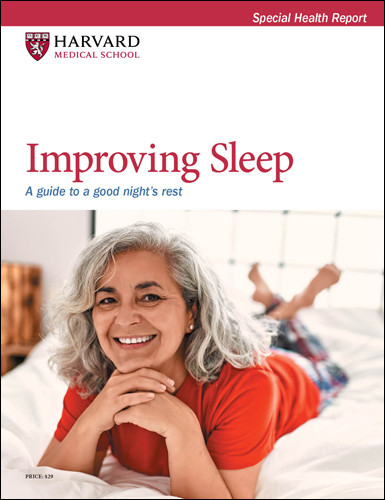What's keeping you from getting a good night's sleep?
Identify your sleep "interrupters" with this list of potential offenders.
- Reviewed by Anthony L. Komaroff, MD, Editor in Chief, Harvard Health Letter; Editorial Advisory Board Member, Harvard Health Publishing

Remember when you could crawl into bed at night and sleep straight through until the morning? Now you wake up several times each night, wondering if you'll ever slumber for long stretches again. This change in sleep habits, called sleep fragmentation, is a natural part of aging, and generally nothing to worry about if you can still get seven to nine hours of nightly shut-eye — the sweet spot for optimum health.
"The concern comes when sleep fragmentation regularly reduces how many hours you sleep each night or keeps you from waking up and feeling refreshed. In that case, something else is probably contributing to the problem, and we need to identify it and treat it," says Dr. Suzanne Bertisch, clinical director of Behavioral Sleep Medicine at Harvard-affiliated Brigham and Women's Hospital.
The importance of sleep
Sleep is the body's time for restoration and recuperation. It's when toxins are flushed out of the brain, tissue is repaired, muscles grow, memories are consolidated, and hormones are released.
Over time, getting too little sleep or fragmented sleep impairs concentration and mood and increases the risks for obesity, high blood pressure, heart disease, diabetes, stroke, cognitive decline, premature death, and possibly glaucoma.
Sleep interrupters
There's a long list of culprits that can interrupt sleep, and you may have a number of them, which compounds the problem. Here are some examples.
Electronics. Electronic gadgets are conveniences of modern-day life. But they create inconvenient side effects when the light from smartphone screens stimulates your brain and keeps you from falling asleep, or when the noise from a TV show, music playlist, or podcast that's playing overnight rouses you from slumber.
Bed partners. Do you have a bed partner who snores or kicks while sleeping? Are pets or children climbing into bed with you? You might not be able to sleep through the disruptions, especially if bed partners crowd you into uncomfortable sleep positions.
Food or alcohol. Eating or drinking anything with caffeine later in the day (such as chocolate, tea, or coffee) can make it hard to stay asleep. So can a late-night snack: it tastes good going down, but it can come back up during the night as stomach acid that causes heartburn. Drinking alcohol in the evening also promotes interrupted sleep. "Alcohol can help you fall asleep at first, but then it causes fragmentation as it wears off," Dr. Bertisch says.
Underlying conditions. Many health conditions can keep you from sleeping through the night. Examples are sleep apnea (pauses in breathing during sleep), chronic pain, neuropathy (pain, numbness, or tingling in the hands, feet, or legs), hot flashes, stress, anxiety or depression, bladder issues that cause frequent nighttime bathroom trips, or tinnitus (ringing in the ears).
Medications. Pills are supposed to help us cope with health problems, not cause them. Yet some medications interfere with sleep. Examples include some antidepressants, steroids, beta blockers to treat high blood pressure, and drugs that treat attention deficit hyperactivity disorder.
The sleeping environment. Is your bed uncomfortable? Is your room too hot? Is there light coming in through a window? These can all interrupt sleep.
Tips for better sleep
|
What you can do
If you frequently wake up feeling that you didn't get enough sleep, and if that's interfering with your day, it's time to get help. Your primary care doctor can look for causes of sleep interruptions and prescribe treatment if necessary.
For example, treatment might be medication if you have heartburn, or a course of cognitive behavioral therapy for insomnia (CBT-i) —a combination of specific behavior changes, such as limiting your time in bed, setting regular wake times, and using relaxation techniques.
"And often, despite how long people have had trouble sleeping, with behavioral changes, treating underlying issues, and at times using targeted sleep medications, we can improve people's sleep and improve their quality of life," Dr. Bertisch says.
Image: © miya227/Getty Images
About the Author

Heidi Godman, Executive Editor, Harvard Health Letter
About the Reviewer

Anthony L. Komaroff, MD, Editor in Chief, Harvard Health Letter; Editorial Advisory Board Member, Harvard Health Publishing
Disclaimer:
As a service to our readers, Harvard Health Publishing provides access to our library of archived content. Please note the date of last review or update on all articles.
No content on this site, regardless of date, should ever be used as a substitute for direct medical advice from your doctor or other qualified clinician.
















